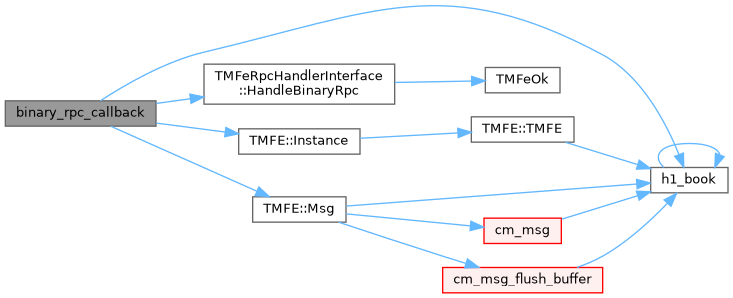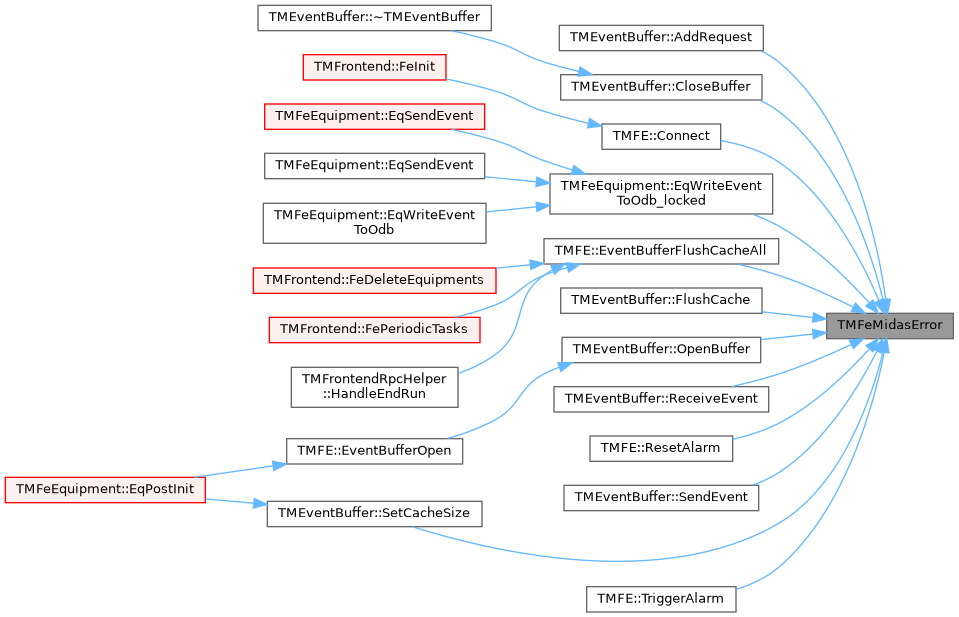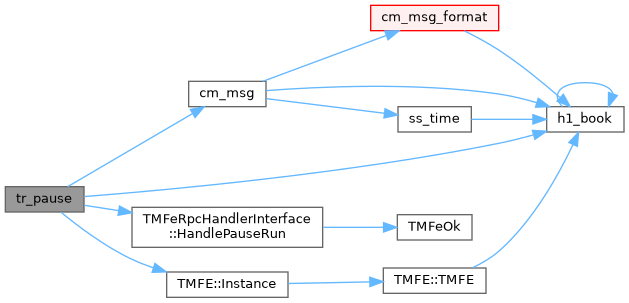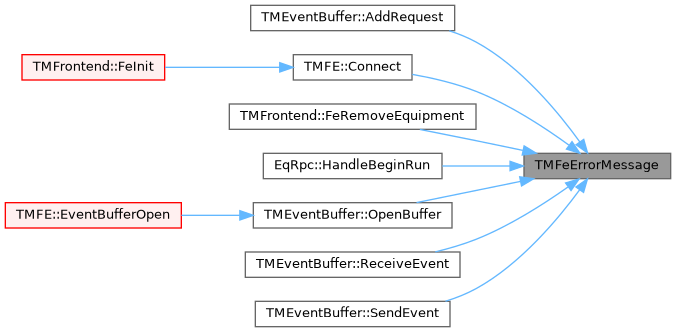Loading...
Searching...
No Matches
#include <stdio.h>#include <stdarg.h>#include <assert.h>#include <signal.h>#include <sys/time.h>#include "tmfe.h"#include "midas.h"#include "msystem.h"#include "mrpc.h"#include "mstrlcpy.h"
Include dependency graph for tmfe.cxx:

Go to the source code of this file.
Classes | |
| class | TMFrontendRpcHelper |
Functions | |
| TMFeResult | TMFeErrorMessage (const std::string &message) |
| TMFeResult | TMFeMidasError (const std::string &message, const char *midas_function_name, int midas_status) |
| static INT | rpc_callback (INT index, void *prpc_param[]) |
| static INT | rpc_cxx_callback (INT index, void *prpc_param[]) |
| static INT | binary_rpc_callback (INT index, void *prpc_param[]) |
| static INT | binary_rpc_cxx_callback (INT index, void *prpc_param[]) |
| static INT | tr_start (INT run_number, char *errstr) |
| static INT | tr_stop (INT run_number, char *errstr) |
| static INT | tr_pause (INT run_number, char *errstr) |
| static INT | tr_resume (INT run_number, char *errstr) |
| static INT | tr_startabort (INT run_number, char *errstr) |
Function Documentation
◆ binary_rpc_callback()
Definition at line 1203 of file tmfe.cxx.
1204{
1209
1211 printf("TMFE::binary_rpc_callback: index %d, max_length %zu, cmd [%s], args [%s]\n", index, return_max_length, cmd, args);
1212
1214
1215 // NOTE: cannot use range-based for() loop, it uses an iterator and will crash if HandleRpc() modifies fEquipments. K.O.
1218 if (!h)
1219 continue;
1220 std::vector<char> result;
1222 if (result.size() > 0) {
1223 if (result.size() > return_max_length) {
1224 TMFE::Instance()->Msg(MERROR, "TMFE::binary_rpc_callback", "RPC handler returned too much data, %zu bytes truncated to %zu bytes", result.size(), return_max_length);
1225 result.resize(return_max_length);
1226 }
1227 //printf("Handler reply [%s]\n", C(r));
1228 assert(result.size() <= return_max_length);
1229 memcpy(return_buf, result.data(), result.size());
1230 CINT(3) = result.size();
1232 }
1233 }
1234
1235 CINT(3) = 0;
1236 return_buf[0] = 0;
1238}
Definition tmfe.h:381
void Msg(int message_type, const char *filename, int line, const char *routine, const char *format,...) MATTRPRINTF(6
Definition tmfe.cxx:991
Definition tmfe.h:87
Definition tmfe.h:145
virtual TMFeResult HandleBinaryRpc(const char *cmd, const char *args, std::vector< char > &result)
Definition tmfe.h:153
Here is the call graph for this function:

Here is the caller graph for this function:

◆ binary_rpc_cxx_callback()
Definition at line 1240 of file tmfe.cxx.
1241{
1244 std::vector<char>* pbuf = CPSTDVECTOR(2);
1245
1248
1249 pbuf->clear();
1250
1252
1253 // NOTE: cannot use range-based for() loop, it uses an iterator and will crash if HandleRpc() modifies fEquipments. K.O.
1256 if (!h)
1257 continue;
1259 if (pbuf->size() > 0) {
1261 }
1262 }
1263
1265}
Here is the call graph for this function:

Here is the caller graph for this function:

◆ rpc_callback()
Definition at line 1145 of file tmfe.cxx.
1146{
1151
1153 printf("TMFE::rpc_callback: index %d, max_length %d, cmd [%s], args [%s]\n", index, return_max_length, cmd, args);
1154
1156
1157 // NOTE: cannot use range-based for() loop, it uses an iterator and will crash if HandleRpc() modifies fEquipments. K.O.
1160 if (!h)
1161 continue;
1162 std::string result = "";
1164 if (result.length() > 0) {
1165 //printf("Handler reply [%s]\n", C(r));
1166 mstrlcpy(return_buf, result.c_str(), return_max_length);
1168 }
1169 }
1170
1171 return_buf[0] = 0;
1173}
virtual TMFeResult HandleRpc(const char *cmd, const char *args, std::string &result)
Definition tmfe.h:152
Here is the call graph for this function:

Here is the caller graph for this function:

◆ rpc_cxx_callback()
Definition at line 1175 of file tmfe.cxx.
1176{
1179 std::string* pstr = CPSTDSTRING(2);
1180
1181 pstr->clear();
1182
1185
1187
1188 // NOTE: cannot use range-based for() loop, it uses an iterator and will crash if HandleRpc() modifies fEquipments. K.O.
1191 if (!h)
1192 continue;
1194 if (pstr->length() > 0) {
1195 //printf("Handler reply [%s]\n", pstr->c_str());
1197 }
1198 }
1199
1201}
Here is the call graph for this function:

Here is the caller graph for this function:

◆ TMFeErrorMessage()
| TMFeResult TMFeErrorMessage | ( | const std::string & | message | ) |
◆ TMFeMidasError()
| TMFeResult TMFeMidasError | ( | const std::string & | message, |
| const char * | midas_function_name, | ||
| int | midas_status | ||
| ) |
Definition at line 34 of file tmfe.cxx.
35{
36 return TMFeResult(midas_status, message + msprintf(", %s() status %d", midas_function_name, midas_status));
37}
Here is the call graph for this function:

Here is the caller graph for this function:

◆ tr_pause()
Definition at line 1408 of file tmfe.cxx.
1409{
1411
1412 TMFeResult result;
1413
1415
1416 // NOTE: cannot use range-based for() loop, it uses an iterator and will crash if HandlePauseRun() modifies fEquipments. K.O.
1417 // NOTE: tr_pause runs in reverse order to match tr_stop. K.O.
1420 if (!h)
1421 continue;
1424 // error handling in this function matches general transition error handling:
1425 // logic is same as "start run"
1426 break;
1427 }
1428 }
1429
1433 }
1434
1436}
virtual TMFeResult HandlePauseRun(int run_number)
Definition tmfe.h:149
INT cm_msg(INT message_type, const char *filename, INT line, const char *routine, const char *format,...)
Definition midas.cxx:931
Here is the call graph for this function:

◆ tr_resume()
Definition at line 1438 of file tmfe.cxx.
1439{
1441 printf("TMFE::tr_resume!\n");
1442
1443 TMFeResult result;
1444
1446
1449
1450 // NOTE: cannot use range-based for() loop, it uses an iterator and will crash if HandleResumeRun() modifies fEquipments. K.O.
1453 if (!h)
1454 continue;
1457 // error handling in this function matches general transition error handling:
1458 // logic is same as "start run"
1459 break;
1460 }
1461 }
1462
1466 }
1467
1469}
virtual TMFeResult HandleResumeRun(int run_number)
Definition tmfe.h:150
Here is the call graph for this function:

◆ tr_start()
Definition at line 1330 of file tmfe.cxx.
1331{
1333 printf("TMFE::tr_start!\n");
1334
1336
1339
1340 TMFeResult result;
1341
1342 // NOTE: cannot use range-based for() loop, it uses an iterator and will crash if HandleBeginRun() modifies fEquipments. K.O.
1345 if (!h)
1346 continue;
1349 // error handling in this function matches general transition error handling:
1350 // on run start, the first user handler to return an error code
1351 // will abort the transition. This leaves everything in an
1352 // inconsistent state: frontends called before the abort
1353 // think the run is running, which it does not. They should register
1354 // a handler for the "start abort" transition. This transition calls
1355 // all already started frontends so they can cleanup their state. K.O.
1356 //
1357 break;
1358 }
1359 }
1360
1364 }
1365
1367}
virtual TMFeResult HandleBeginRun(int run_number)
Definition tmfe.h:147
Here is the call graph for this function:

◆ tr_startabort()
Definition at line 1471 of file tmfe.cxx.
1472{
1474 printf("TMFE::tr_startabort!\n");
1475
1476 TMFeResult result;
1477
1479
1480 // NOTE: cannot use range-based for() loop, it uses an iterator and will crash if HandleStartAbortRun() modifies fEquipments. K.O.
1483 if (!h)
1484 continue;
1487 // error handling in this function matches general transition error handling:
1488 // logic is same as "start run"
1489 break;
1490 }
1491 }
1492
1494
1498 }
1499
1501}
virtual TMFeResult HandleStartAbortRun(int run_number)
Definition tmfe.h:151
Here is the call graph for this function:

Here is the caller graph for this function:

◆ tr_stop()
Definition at line 1369 of file tmfe.cxx.
1370{
1372 printf("TMFE::tr_stop!\n");
1373
1374 TMFeResult result;
1375
1377
1378 // NOTE: cannot use range-based for() loop, it uses an iterator and will crash if HandleEndRun() modifies fEquipments. K.O.
1379 // NOTE: we need to stop thing in reverse order, otherwise TMFrontend code
1380 // does not work right - TMFrontend is registered first, and (correctly) runs
1381 // first at begin of run (to clear statistics, etc). But at the end of run
1382 // it needs to run last, to update the statistics, etc. after all the equipments
1383 // have done their end of run things and are finished. K.O.
1386 if (!h)
1387 continue;
1390 // error handling in this function matches general transition error handling:
1391 // the "run stop" transition is always sucessful, the run always stops.
1392 // if some frontend returns an error, this error is remembered and is returned
1393 // as the transition over all status. K.O.
1394 result = xresult;
1395 }
1396 }
1397
1399
1403 }
1404
1406}
virtual TMFeResult HandleEndRun(int run_number)
Definition tmfe.h:148
Here is the call graph for this function:

